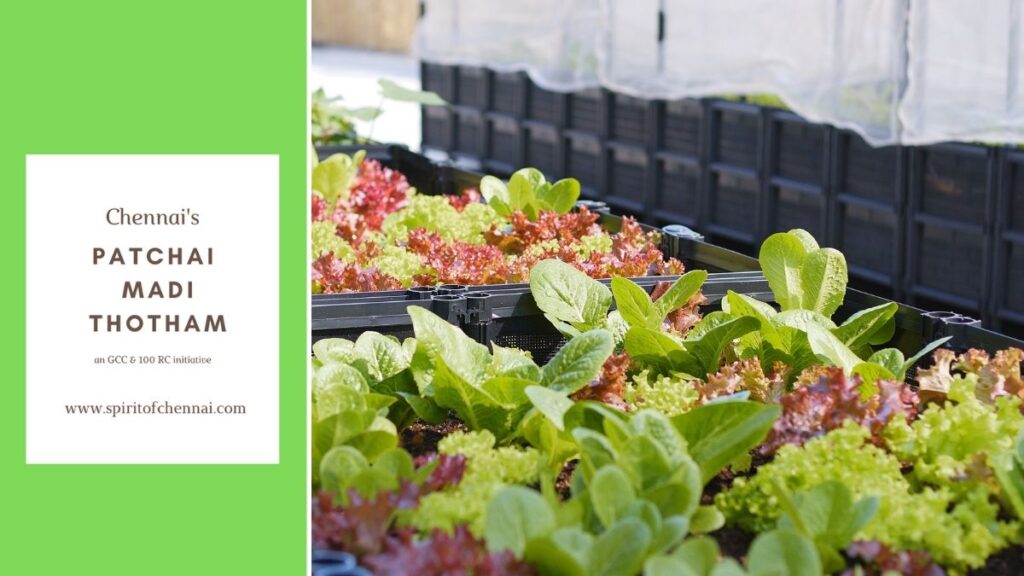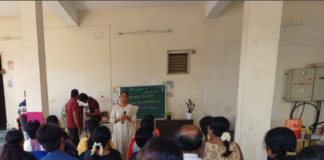The steaming hot meals cooked from freshly plucked french beans, spinach, tomatoes, and green chillis. The aroma of the home garden spices to fill the room as much as it fills the little children’s appetite. Taste nevertheless, to say, will be more authentic and satiating
Welcome to Chennai Corporation School’s new mid-day meals scheme and the novel Patchai Madi Rooftop Garden initiative.
When the schools resume from the lockdown, most of the vegetables that go behind the mid-day meals will be sourced directly from the school’s rooftop gardens.
Patchai Madi Thottam – How did it all begin?
It all started when Mr. Krishna Mohan, the chief resilient officer of 100 Resilient Cities (100 RC), had a eureka moment while glancing his very own Chennai city from a cruising altitude of 5000 feet up in the air. As the aircraft glided over the city to land, his vision to convert Chennai’s barren terraces to green rooftop gardens, took off.
Through his organization 100 RC, he approached the Chennai City Commissioner G.Prakash (IAS) to explore the possibilities of changing Chennai’s arid concrete terraces into green rooftop gardens. The city’s leadership liked the idea and endorsed it. Greater Chennai Corporation, along with other city departments, through 100 RC, is now all set to start the Patchai Madi Thottam idea formally as Chennai Urban Horticulture Initiative (UHI).

Chennai Urban Horticulture Initiative (UHI) goals for Chennai City:
The organization aims to achieve two goals through UHI.
- First Goal is to actively work alongside city’s citizen stakeholders like Resident Welfare Associations (RWA) and volunteers to convert the thousands of acres of Chennai rooftops to home gardens. The project is going to commence in two Chennai neighborhoods, which has a strong RWA network reputation.
- The second goal is to catalyze change in the 200 Chennai Corporation schools by helping them set up vegetable gardens, both on the ground and in rooftops. The UHI scheme will commence in 15 schools, to begin with.
100 RC, in particular, has a vision 2030 plan to replace all of Chennai fallow terraces into rooftop gardens.
Chennai Resilient City Vision Plan
Through these goals, Greater Chennai Corporation, 100 RC, and other stakeholders are hoping to convert Chennai as a self-sustaining city. This project will involve state agencies like the Tamil Nadu Department of Horticulture and Plantation, Tamil Nadu Corporation for Development of Women, and Tamil Nadu Agricultural University.
Chennai’s reputed eco-conversation organization Care Earth Trust will play an active role in counseling stakeholders on species selection (types of plants), that can be grown for UHI – Chennai rooftop gardens.
Benefits of Chennai’s Pachai Madi Thottam?
The benefits of a green rooftop garden initiative are multi-fold. From nutritiously homegrown meals to building ecologically green buildings and mitigating urban heat or climate change, the Chennai citizens can benefit a lot from this eco-friendly green project.
The foremost and most immediate benefits are organic food produce. Vegetables and fruits from the home garden are more nutritious, given the lesser chemical fertilizers or preservatives used to grow or preserve them. Fresh to the plate, the meals made from homegrown food will be palatable and will also make residents self-reliant. People who have their home gardens need not wait in long queues in the event of a City Lockdown or retailer strikes. No more mad rushes and stocking sprees, in the event of urban crisis. Patchai Madi Thootam, if implemented as planned, will bring food sustainability to every household.
The second prominent benefit of the Patchai Madi Thootam or the Urban green initiative is Solid waste segregation and recycling. Bio-degradable waste, widely considered an organic compost for rooftop gardens, will mostly be recycled within the respective homes, to make natural fertilizers, vermicompost, and soil humus. If implemented well, the Urban Horticulture Initiative will improve waste management and solid waste trends of the city.
Rooftop gardens by virtue threads along with climate action initiatives, as well. More green cover in the city can undo the urban heat island effect of the Chennai Megalopolitan. The increase in vegetational cover can combat the city Carbon-di-oxide (CO2) levels, and to some extent, offset regional warming. This would mean that there is some hope of a pleasant, better climate in the otherwise hot, hotter, hottest tropical city.
Finally, not just for Mr. Krishna Mohan, but for millions of others who glide towards Chennai from the air, there will be a greener aerial view of the city’s rooftop gardens.
For, ‘Patchai Madi Thottam’ will be coming their way!



